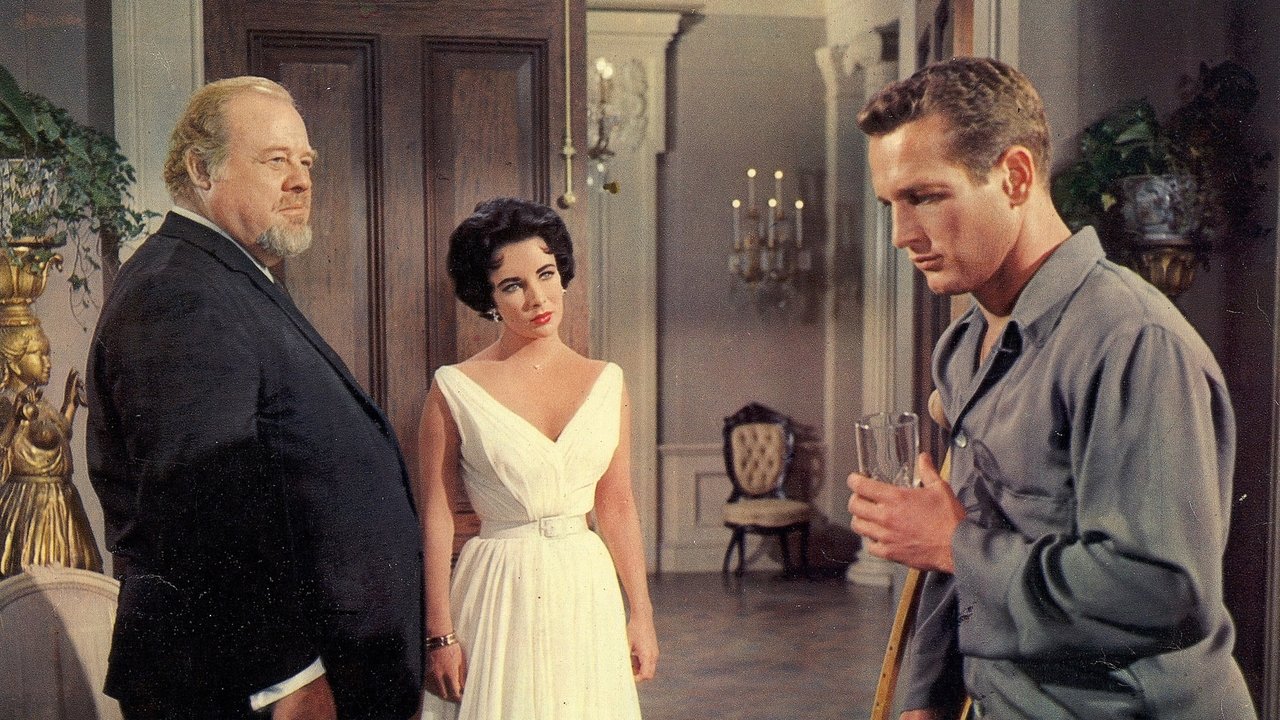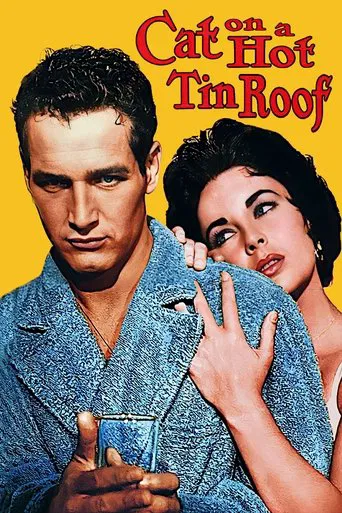

Who payed the critics
... View MoreThe greatest movie ever!
... View MoreEach character in this movie — down to the smallest one — is an individual rather than a type, prone to spontaneous changes of mood and sometimes amusing outbursts of pettiness or ill humor.
... View MoreThe movie really just wants to entertain people.
... View MoreA memorable drama, with superb performances by Elizabeth Taylor, Paul Newman, and Burl Ives. The undercurrent of Taylor and Newman's wrecked marriage energizes the plot; they "occupy the same cage" as Taylor's Maggie puts it. She relentlessly tries seduction, but Newman could care less.As others have pointed out, Brick's brother is presented as a hen-pecked mediocrity, his family fairly trashy, while Brick and Maggie are the 'cool couple.' Actually, Gooper is a solid citizen, and Brick is a bitter alcoholic. It's amusing how Ives' Big Daddy shows no respect for Gooper's family, dropping sarcastic bombs all over them. Nonetheless, he's even more upset by Brick's non-conformity. It would be interesting to have a sort of prequel in which Brick's relationship with Skipper is shown, instead of just referred to. That would've been impossible in the 50s. In fact, it's surprising that the gay theme was explored in such depth, even if inferentially. Big Daddy is consumed by Brick's inclination; he can't understand it, for him it's a problem that should have a solution.Still, he shows considerable sensitivity to Brick. He never insults Brick, as he does everyone else, Maggie excepted. "We even love your hate" as Big Momma aptly puts it. He goes through a huge effort to shoo everyone away when he wants to talk to Brick. "Now that I'm straightened out, I'm gonna straighten you out!" Big Daddy tells him. Brick's alcoholism is the buffer between the way he is, and the way he's expected to be. The thunderstorm breaks, literally, just as they bring up Skipper. While Skipper was losing control, just before his suicide, Maggie wanted to go bed with him in an ironic attempt to keep him away from Brick by trying to 'fix' him. Interestingly, Big Daddy shows concern for Skipper, realizing that Brick is partially responsible for Skipper's death. Big Daddy has sensitivity, but lacks love.After Big Daddy discovers that he will die, the family argument over the estate rivals Brick and Bid Daddy's earlier argument for its intensity. It succeeds in pointing out Gooper's greed and shallowness. The climactic cellar scene telescopes the show's themes adroitly; Brick and Big Daddy finally do understand each other, and each other's strengths and weaknesses. The last scene, however, seems artificial, as though Brick can change his nature through an act of will.Cat On a Hot Tin Roof is an excellent movie, very passionate and very intelligent.
... View MoreCensorship or not it was okay. If they remove the homosexual theme today it would not have been received well. So if we ignore that for a second it is like one of those movies in real time where the scale is 1 minute in the movie equals 1 minute in the real world. At first you are aware that Brick's relationship with his wife is strained and the same goes to his relationship with his father. His father is dying and all family members have gathered like vultures. Brick's brother and family were shameless at it. If you hate the antagonists then its good acting. If you love the good guys despite their faults because they are relatable and seem human its a good plot and script. Bring back what we ignored and add whitewashing to its list of crimes then its just sad. If you can look past that then good for you.
... View MoreIn 1958 Hollywood censorship restrictions were still sufficiently all-pervasive to necessitate a toning-down of Tennessee Williams's CAT ON A HOT TIN ROOF (1955). Most of the homosexual themes were removed, and the third act revised to include a lengthy scene of reconciliation between Brick (Paul Newman) and Big Daddy (Burl Ives). Williams so disliked the toned-down film adaptation of his play that he told people in the queue, "This movie will set the industry back 50 years. Go home!"Despite the author's misgivings, the homosexual element is still very much evident in Richard Brooks's and James Poe's screenplay. Brick is full of self-loathing in the belief that he has contributed to his close friend Skipper's death, and cannot stand Maggie (Elizabeth Taylor) to be anywhere near him. While the film shows Brick and Maggie coming together at the end in sexual congress, we still doubt whether it will be a success in light of Brick's previous behavior. The film talks of a "close friendship" between himself and Brick in such open terms that we cannot help but doubt that there was a sexual element to it.Even if we accept that the film slightly bowdlerizes the source- text, we are left with a work that hits viewers with the emotional kick of a mule. Shot in garish color that brings out the sheer awfulness of the celebrations mounted for Big Daddy's birthday by Sister Woman (Madeleine Sherwood) and her overfed offspring, the film emphasizes just how much "mendacity" - or the perpetual telling of lies - has destroyed this family. The action unfolds in a series of powerful scenes involving one or two characters - Maggie and Brick, Big Daddy and Brick - where they quite literally tear the emotional heart out of one another. Brooks favors long takes interspersed with frequent close-ups portraying the mental as well as physical strain the characters undergo.Yet perhaps this is inevitable in a traditional Southern world where child-rearing is accepted as inevitable and love takes second place to power. Gooper (Jack Carson) is a successful lawyer, giving him the (totally unwarranted) belief that he has an automatic right to inherit Big Daddy's estate when Big Daddy passes. In his slate-gray suit and slicked-back hair, he looks every inch the efficient executive as opposed to the slatternly Brick, who spends much of the first of the film in his pajamas, with a crutch to help him move around.Big Momma (Judith Anderson), although sympathetic towards Brick, encourages such beliefs with her relentless quizzing of Maggie as to why Maggie has not yet produced a child. In light of such pressures, it's hardly surprising that Brick should have begun a homosexual relationship as a means of escape, an alternative form of love based on passion rather than duty.Newman and Taylor's exchanges are memorable; two actors at the cusp of mega-stardom taking advantages of Williams's brilliant writing to portray two characters victimized by their surroundings. It's not their fault that they cannot consummate their relationship: circumstances dictated their destiny. As Big Daddy, Ives is both imperious yet vulnerable, his body quite literally succumbing to cancer, even though is mind remains dominant.Stylistically speaking this version of CAT ON A HOT TIN ROOF might appear somewhat theatrical, with its claustrophobic-like settings and long takes. Yet it retains the capacity to shock viewers with its stark rawness, even though it is nearly six decades since its original release.
... View MoreThere's a certain feel and boldness to this story that makes us simply sure we're talking about another wonderful work by Tennessee Williams. When I started watching the film, I had no idea it was based on his play, later on when I found out, it made total sense. He always seems to treat taboo questions in a very open and artistic manner (in a similar way to "A Streetcar Named Desire"). This one deals with a very strong patriarch figure inside the family, "Big Daddy" Pollitt, it's not only a pet name, it's also an indicative of his size and place inside the family tree. And he is a hard-headed figure, who imposes his opinions no matter what, a question of obeying the law.The main affected by this tyranny seems to be Paul Newman's character, Brick Pollitt. We meet him as a recovering alcoholic and ex-football player, in a most iconic scene beside Elizabeth Taylor. From the first moment we learn he has some kind of animosity towards his perfectly beautiful wife, the sexual undertones are present at all times. It's instigating, why shouldn't any perfectly normal and handsome husband feel sexually attracted to his perfectly beautiful wife? Hence the genius name of the movie, she feels like a cat on a hot tin roof. Those questions are soon brought to us through Big Daddy's (and the rest of the family) interference in their relationship. The scenes where he and Brick discuss over the motives for his bitterness over life are simply amazing. There's a mixture of sexual frustration, paternal repression, and some level of homosexual affection going on. There's also Big Daddy's health condition, he seems to be ill and his prognosis not so good. Brick in a way wishes him to die, at times it seems like that's the only way he could ever grab domain of his own life again.Although waved to us, full answers are never given (especially the nature of Brick's relationship with his late friend, plus Maggie's involvement in it), because we only have access to a small fraction of that family's feuds, when the (never harmonious) system is already in decadence. The end features an interesting turn of events, the father and son conflict finds some kind of relief, perhaps in the light of nostalgia and death approaching. And so does Brick's relationship with Maggie, the cat, the last scene boasts with lust as we watch their reconciliation as Paul Newman delivers the line: "Maggie, we're through with lies and liars in this house. Lock the door."
... View More